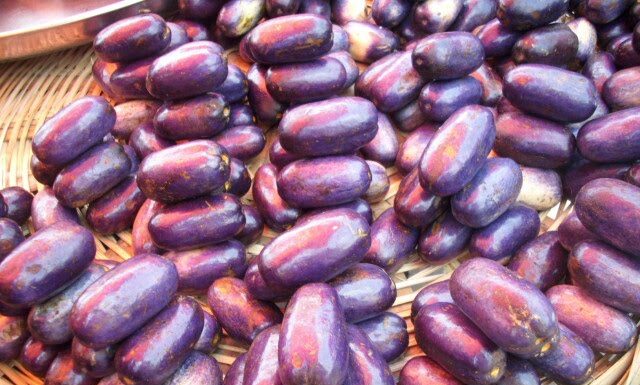African pear or bush pear is a native fruit of West Africa, mainly found in South-East Nigeria, where it is popularly called ube. It is botanically known as Dascroides edulis.
Studies have revealed that ube is loaded with essential ingredients for warding off diseases and could protect women against postmenopausal breast cancer. These ingredients include carbohydrates, sugars, fibre and vitamins (especially thiamine, riboflavin, niacin, panthotenate folate, vitamin C and vitamin B6).
Ube has been scientifically proven to possess a broad range of medicinal, pharmacological and biological properties that are highly beneficial to human health. They are believed to be anti-microbial, anti-inflammatory, anti-hypertensive, diuretic, and antispasmodics in nature.
Researchers believe that these properties are as a result of the chemical constituents of the pear such as phytochemicals, minerals, sugars, vitamins, lipids and protein.
African pear have been hailed by health experts for its health benefits because it possesses a broad range of medicinal, pharmacological and biological properties that are highly beneficial to human health. Here’s a list of some of the benefits:

- High in calcium and used for toothpaste
Ube has a lot of antimicrobial properties. The antimicrobes keep bacteria that are responsible for mouth odour and tooth decay away. Its high concentration of calcium and phosphorus makes it a good supplement for the development and maintenance of healthy bones and teeth.
2. Helps in healthy bowel movement
This fruit is rich in fiber and helps prevent constipation and also ensures regularity of bowel movement. It adds bulk to the stool which makes the process of passing stool easier. Pears eaten with the peel can improve digestion, whether boiled or fried. The fibre in pears can also regulate blood pressure, such as pregnancy hypertension. This could lower the chances of developing conditions like preeclampsia.
- It is a good source of vitamin C
Vitamin C is great for pregnancy. It is especially needed in this stage of women’s lives. As an antioxidant, it helps several functions in the body like strengthening the immune system. In addition, it protects pregnant women from bacteria and germ infections. Also, in pregnant women, it encourages the body to absorb iron which is essential for foetal growth. It should be eaten with other foods with high iron content such as rice and meat.
- Potassium and magnesium in African peers
Though pears only contain a small amount of potassium, it is still important at cellular and tissue levels. It reduces the likelihood of cramps in the abdomen or legs which improves comfort. It also stabilises the nervous system, improving motor functions and coordination. The magnesium contained in African pear provide normal operation of the heart muscle and regulate the water-salt.
- Vitamin B6 in African Pears
The B-Vitamins are a set of important nutrient for pregnant women, the deficiencies of which can cause foetal defects. This vitamin improves cognitive and motor function development in foetuses and newborns. It also helps in foetal nerve tissue growth. Vitamin B6 actively reduces the frequency of pregnancy symptoms like nausea and vomiting that happen during the first trimester.
- Iron in African pears
African pears have a high iron content compared to most fruits. Eating it through your day can improve your iron reserve. If you are feeling dizzy, fatigued or other symptoms of anaemia, Africa peers will help combat this. Many pregnant women complain of loss of appetite at the initial stage. As pears are very nutritious, they will help you to increase your appetite. It occurs due to a lot of glucose and fructose in this fruit.
7. It can be used by local doctors
The green paste of the pear is used by traditional doctors to treat open faced wounds. Ring worms, skin rashes, and other parasitic wounds are cured using Ube.
References:
REFERENCES
Arisa, N. U., Lazarus, A., 2008. Production and refining of Dacryodes edulis “native pear” seeds
oil, African Journal of Biotech. 7 (9), pp. 1344-1345.
Ajayi, I. A. and Oderinde, R.A. (2002), Studies on the oil characteristics of Dacryodes edulis
pulp and seeds, Discovery and Innovation, 14, pp.20-23.
Boelhouwer, C. (1983), Trends in Chemistry and Technology of Lipids, Journal of American Oil Chem. Soc. 60 (2), pp. 457-461.
Bratte, L., Mmereole, F.U.C., Akpodiete, O.J. and Omeje, S.I. (2010), The Nutrient Composition of Seeds of the African Pear (Dacryodes edulis) and its Implications for Non-Ruminant Nutrition, Pakistan Journal of Nutrition 9 (3), pp. 255-257.
Isaac, I. O., Ekpa, O. D., Ekpe, U. J. (2014), Extraction, Characterization of African Pear (Dacryodes Edulis) Oil and its Application in Synthesis and Evaluation of Surface Coating Driers, International Journal of Advanced Research in Chemical Science (IJARCS), Vol. 1, Iss. 4, PP. 14-20.










